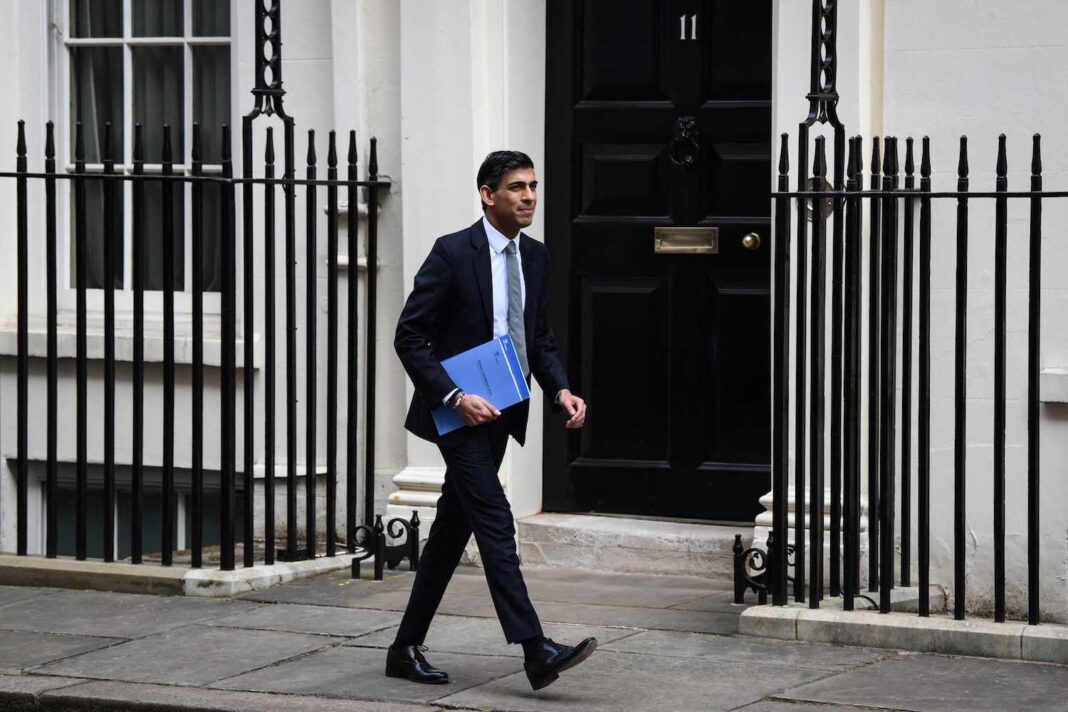LONDON: British finance minister Rishi Sunak cut taxes for workers and reduced a duty on fuel on Wednesday as he sought to soften a severe cost-of-living squeeze against the backdrop of fast-rising inflation and slowing economic growth.
Announcing a half-yearly budget update overshadowed by the conflict in Ukraine, Sunak set out measures that would inject about 17.6 billion pounds ($23.2 billion) into the economy in the coming financial year.
“The actions we have taken to sanction (Russian President Vladimir) Putin’s regime are not cost-free for us at home,” he told parliament. “The invasion of Ukraine presents a risk to our recovery – as it does to countries around the world.”
In response to the hit to living standards — with inflation seen peaking at nearly 9 percent in late 2022 — Sunak said he was increasing the threshold at which workers start to pay national insurance, or social security, contributions by 3,000 pounds ($3,958.50) from July.
“That’s a 6-billion-pound personal tax cut for 30 million people across the United Kingdom,” he said, adding it would save workers more than 330 pounds a year each and was the largest single personal tax cut in a decade.
But Sunak stuck to his plan to increase the level of national insurance contributions from next month to help fund more spending on health and social care after the COVID-19 pandemic.
In his Spring Statement, Sunak announced a cut in fuel duty of 5 pence per liter, to start later on Wednesday and last until March next year. He said the basic rate of income tax would be reduced by one pence in the pound in 2024, when Britons are next to due to vote in a general election.
However, the Office for Budget Responsibility (OBR), which produces the forecasts that underpin the government’s budget planning, said Sunak was undoing only one sixth of the tax rises he has previously announced.
The OBR also said living standards, adjusted for inflation, would not recover their pre-pandemic levels until the 2024/25 financial year and would suffer their biggest contraction in the 12 months from April since at least the mid-1950s.
Sunak and Prime Minister Boris Johnson have been under pressure, including from lawmakers within their Conservative Party, to do more to help households as they struggle with the rising cost of living.
Sunak announced new forecasts showing the British economy will grow more slowly this year than previously predicted and that inflation will be much higher.
The forecasts drawn up by the OBR showed the economy was likely to grow by 3.8 percent in 2022, a sharp slowdown from a forecast of 6.0 percent made in October.
Inflation, as measured by the consumer price index, is now seen at 7.4 percent in 2022, compared with October’s forecast of 4.0 percent.
Earlier, data showed Britain’s consumer price inflation hit a 30-year high of 6.2 percent last month, driven by soaring costs for energy and food which poorer households especially may find hard to cut back on.
The OBR forecast that gross domestic product would grow by 1.8 percent, 2.1 percent and 1.8 percent in 2023, 2024 and 2025.
In October, the OBR had forecast growth of 2.1 percent, 1.3 percent and 1.6 percent over the next three years.
The OBR said borrowing by the government was due to come in 55 billion pounds lower than it expected in October.
Sunak said the fiscal rules he set for the public finances would be met with “a clear safety margin.” ($1 = 0.7579 pounds)
UK’s Sunak cuts taxes to soften cost-of-living hit




